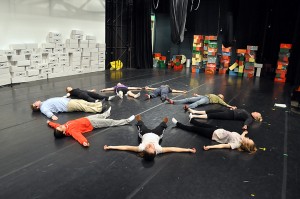By Ellie Honan
After several sweat-inducing experiences at Zumba, I went to Aniko Drlik-Muehleck’s [ ’11] dance workshop Wednesday, Feb. 9 in my full workout apparel—although still slightly nervous at my lack of dance experience. As it turned out, both my workout clothes and my fears were entirely unwarranted, because the dance workshop did not actually involve much physical activity. The workshop was the first of a sequence of studies for Drlik-Muehleck’s Mentored Advanced Project (MAP) on Communities and Dance. Although Drlik-Muehleck is an Economics major, she says that dance has always been an important part of her life, both before and during her years at Grinnell.

We started off in a circle, lying down and focusing on our breath, and we pulled ourselves upright by taking each other’s hands. We sat their talking before splitting off into pairs to get to know each other and to discuss communities that we have been a part of throughout our lives and our first memories of dance. The group was small and I did not know anyone when I arrived, but something about sitting together in our small circle on the brightly lit stage of the empty auditorium, with the added effect of the physical touch involved in holding hands, made me feel strangely bonded to the others. As we talked about the various communities we have been a part of the discussion turned to what makes a community and how communities have changed over time.
As the discussion drew to a close, Drlik-Muehleck brought up the way that dance has been a way of building and maintaining communities throughout history and how that quality is somewhat lacking in our generation. While our grandparents used to dance socially on a regular basis, we are uncomfortable dancing unless the room is dark and alcohol is dimming our senses. Can you imagine Harris with the lights on? Or sober? We discussed how this lack of dancing may be affecting our sense of community and whether virtual communities—lacking the possibility of dance—could ever replace physical communities.The workshop ended far too quickly, but the next one will pick up the discussion where we left off and will include moving activities connecting ideas to movements. The ultimate goal is to choreograph a dance based on the discussions held in the various workshops. The performance will include the college students involved who attend the workshops as well as some Mayflower Homes residents and younger children from Grinnell—including an 8th grader who attended Wednesday’s workshop. Newcomers are welcome at future workshops, but even if you do not attend the workshops, be sure to stay tuned for the final performance— the audience may be involved!


















































